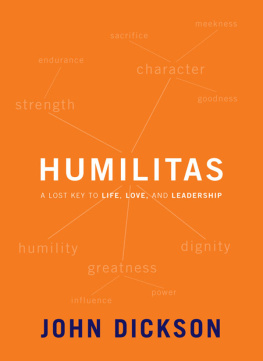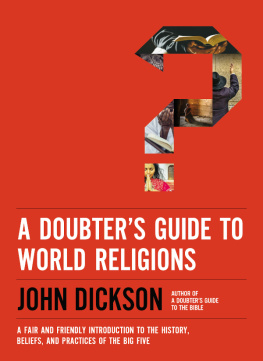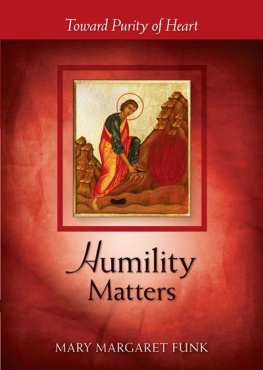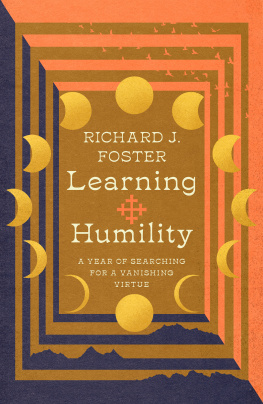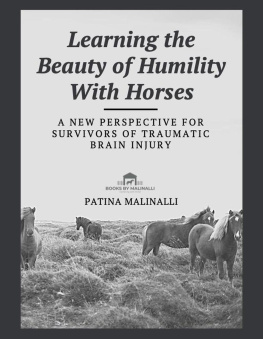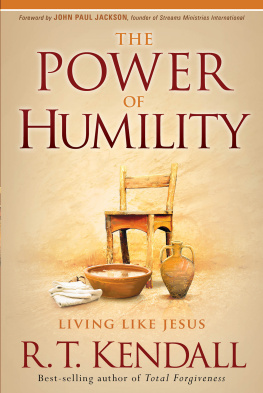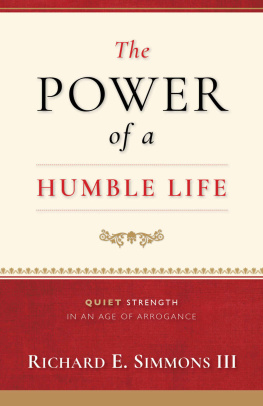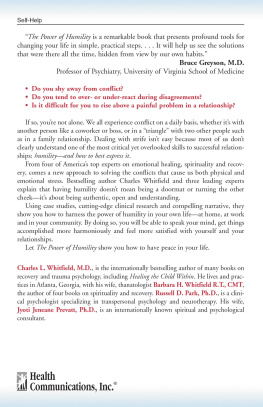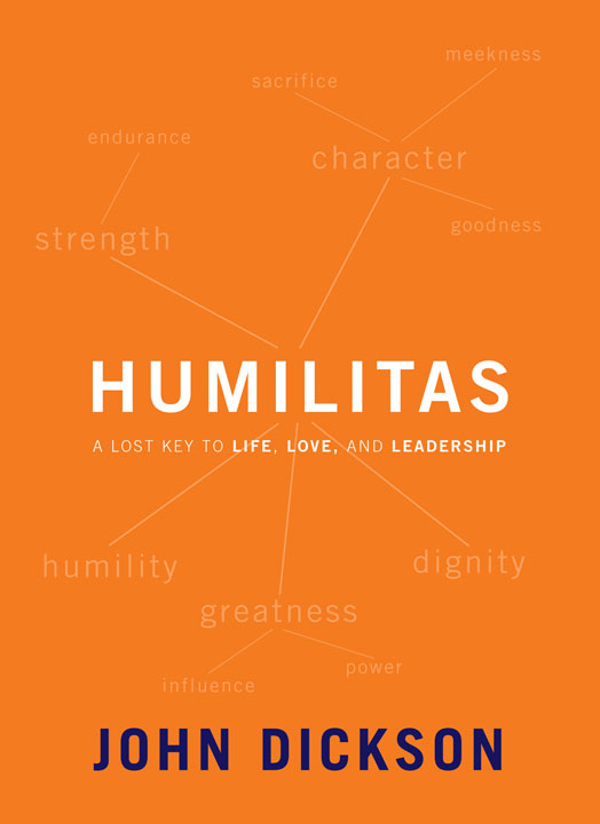ZONDERVAN
Humilitas
Copyright 2011 by John Dickson
This title is also available as a Zondervan ebook.
Visit www.zondervan.com/ebooks.
This title is also available in a Zondervan audio edition.
Visit www.zondervan.fm.
Requests for information should be addressed to:
Zondervan, Grand Rapids, Michigan 49530
Library of Congress Cataloging-in-Publication Data
Dickson, John, 1967-.
Humilitas : a lost key to life, love, and leadership/John Dickson.
p. cm.
ISBN 978-0-310-32862-9 (hardcover)
1. HumilityReligious aspectsChristianity. I. Title.
BV4647.H8D53 2010
241.4dc22 2010039774
All Scripture quotations, unless otherwise indicated, are taken from the Holy Bible, New International Version, NIV. Copyright 1973, 1978, 1984 by Biblica, Inc. Used by permission of Zondervan. All rights reserved worldwide.
Any Internet addresses (websites, blogs, etc.) and telephone numbers printed in this book are offered as a resource. They are not intended in any way to be or imply an endorsement by Zondervan, nor does Zondervan vouch for the content of these sites and numbers for the life of this book.
All rights reserved under International and Pan-American Copyright Conventions. By payment of the required fees, you have been granted the non-exclusive, non-transferable right to access and read the text of this e-book on-screen. No part of this text may be reproduced, transmitted, down-loaded, decompiled, reverse engineered, or stored in or introduced into any information storage and retrieval system, in any form or by any means, whether electronic or mechanical, now known or hereinafter invented, without the express written permission of Zondervan.
Epub Edition APRIL 2011 ISBN : 978-0-310-57200-8
11 12 13 14 15 16 /DCI/ 19 18 17 16 15 14 13 12 11 10 9 8 7 6 5 4 3 2 1
Information about External Hyperlinks in this ebook
Please note that footnotes in this ebook may contain hyperlinks to external websites as part of bibliographic citations. These hyperlinks have not been activated by the publisher, who cannot verify the accuracy of these links beyond the date of publication.
For
Paul Barnett,
Bruce Robinson,
and Richard Grellman,
mentors,
who know more about this subject than I do but would never presume to write a book about it
Contents
Introduction
Humility and How I Achieved It
T HERE IS AN OBVIOUS CONUNDRUM FACING THE WRITER and readers of a book on humility. Does the author think he has attained this difficult virtue? If so, he almost certainly hasnt. If not, why is he writing a book on the topic?
Strangely, the dilemma doesnt seem to apply to other virtues. I could probably get away with writing a book on compassion in organizations or discipline in relationships or generosity in public life without raising eyebrows. But there is something about advocating humility that makes people, especially the author, feel a little uncomfortable (obviously, not uncomfortable enough for me not to write the book and for you not to pick it up, but you know what I mean). Humility stands alone among the virtues in that as soon as you think you have it, you probably dont. And, yet, the reverse does not follow. Not thinking yourself humble is no indication that you are. You might be right! Both the arrogant and the humble are unlikely to think of themselves as humble. So, how could you ever know if you have attained the virtue? This is not the only paradox we will meet in our discussion.
Let me tell you how I see myself as the author of a book on humility. I am a dominance-leaning, achievement-focused, driven personality who has accidentally fallen in love with an intriguing ancient virtue. I say this not as a cute way to introduce a book on the topic. It is the reality. From the start of my love-hate relationship with humility, friends and close colleagues frequently noted a certain irony that Dickson had become interested in the theme. I will never forget the comment of my best friend of thirty-five years when I told him I was involved in a research project at Macquarie Universitys ancient history department on the origins of humility in Western ethical thought. He quipped, Well, John, at least you have the objective distance from the subject! (One of the keys to developing humility is spending more time with friends who speak plainly.)
I was recently confronted with proof of this objective distance". I work with a not-for-profit think tank and media company. As part of my professional development last year I submitted to the well-known DISC analysis of behavioural patterns. Developed fifty years ago by psychologists from Harvard University and refined constantly since then, DISC assesses people along four quadrants: dominance, influence, steadiness and conscientiousness. We all display features of these four descriptors, but each of us tends toward one more than the others.
I wont keep you guessing my own tendency: high dominance with an intensity score of 26.5 out of 28". Many leaders probably fall into this category. They might also think of it as a badge of honour. I did too for a few minutes, until I read the detailed report. Unfortunately, dominance does not mean high-achieving, competent or fit to lead. There is no formal connection between this quadrant and effectiveness. It just means that, whatever their capabilities and principles, dominance individuals like to assert viewpoints and control situations. (I suspect many serial killers would score high in Dominance.) To quote the reportas much of it as my wife will allow me to publish:
John, you are high in the Dominance (D) dimension. As a result, you are likely to be focused on shaping your environment by overcoming opposition to achieve results As someone with a Result-Oriented Pattern, you tend to be a quick thinker who displays self-confidence. [No problem so far, right?] You are usually determined and persistent. You may frequently display a dominant personality that increases the odds you will be viewed as forceful and direct. [Then comes the slug.] Your tendency to be fiercely independent may frequently give you an air of self-importance. Adding to this perception is that you may often become impatient or haughty Rather than overstep your boundaries or exceed your authority, it might be beneficial for you to verbalise your reasoning. Explaining your rationale may frequently prevent conflicts from arising. An additional way to boost your efficiency would be to increase your patience and improve your sense of humility.
For several years now I have been trying to improve my sense of humility". In fact, for the last three years it has been #3 of my eleven yearly goals. Ive seen about as much progress here as I have with goal #11: learn to cook three nice meals. Ive nearly perfected the traditional Indonesian dish Gado-gado, but thats about it. It was following my DISC assessment that I emailed my publisher with what I hoped they would recognize as a joke. Stop press, I wrote, Ive come up with the perfect title for the new book: Humility and How I Achieved It. Within hours I got a reply in the form of a brilliant book-cover design based on the idea. It featured a huge smiling image of me and multiple endorsementsfrom meand was accompanied by a marketing rationale: We feel strongly that it represents your brand and meets our marketing and consumer objectives Overall, the cover, title, and photo really capture the essence of your message. It will, no doubt, stop people in their tracks. It was a humorous, if slightly disturbing, reminder of my objective distance from this subject.

